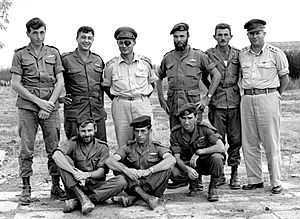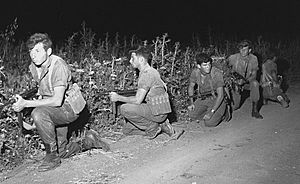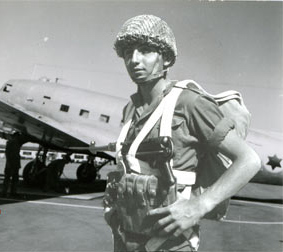Meir Har-Zion facts for kids
Quick facts for kids
Meir Har-Zion
|
|
|---|---|

Meir Har-Zion, 1955
|
|
| Born | 25 February 1934 |
| Died | 14 March 2014 (aged 80) |
| Allegiance | Israel |
| Unit | Unit 101; 890th Paratroop Battalion |
Meir Har-Zion (Hebrew: מאיר הר ציון; February 25, 1934 – March 14, 2014) was a famous Israeli commando soldier. He was known for his bravery and skill.
Many top military leaders praised him. Chief of Staff Moshe Dayan called him "the finest of our commando soldiers." Ariel Sharon described him as "the elite of the elite." Meir Har-Zion's military career was short, from 1954 to 1956. He was injured in battle, but he returned to serve in the 1967 and 1973 wars. The character of Ari Ben-Canaan in Leon Uris's book Exodus is thought to be based on him.
Contents
Early Life and Adventures
Meir Har-Zion was born in Herzliya, Israel, in 1934. His family had lived in the area for many generations. When he was three, his family moved to Rishpon. His two sisters, Shoshana and Rachel, were born there.
When Meir was 14, his parents divorced. He moved to kibbutz Ein Harod with his father. His mother and sisters moved to kibbutz Beit Alfa. As a child, Meir loved exploring nature. He often went on long walks, sometimes even crossing into neighboring countries.
In 1951, when he was 17, Meir and his sister Shoshana were captured. This happened while they were on the Syrian side of the border. They were held in Damascus for a month. The UN and both governments worked to get them released. Their capture made international news.
Meir and Shoshana were very close. They often went on adventurous trips together. They sometimes crossed illegally into Arab countries.
During the 1950s, many Israeli teenagers tried to reach the ancient city of Petra. Petra is located about 40 kilometers inside Jordan. These cross-border treks were seen as a brave challenge for young people.
When Meir was 18, he and his girlfriend successfully reached Petra. They hiked for three days and managed to enter the ancient city at night. This amazing feat made them legendary among Israeli youth. Petra was seen as an almost impossible place to reach. Meir later said, "We had only a compass and a map, but that was enough to find our way to Petra."
Joining Unit 101

In 1953, Meir Har-Zion became a founding member of Unit 101. This was a special forces unit of the IDF. He took part in the unit's first mission in August 1953. This mission involved attacking Bedouin camps near al Auja.
In October 1953, Unit 101 joined a larger IDF force in an attack on the village of Qibya. Har-Zion led one of the squads. Their job was to stop any enemy reinforcements from arriving.
In December 1953, Har-Zion led two Unit 101 squads. They ambushed a car on the Bethlehem-Hebron road. Later, he led a small team on a long march to the edge of Hebron.
He also took part in other important missions. These included Operation Black Arrow and Operation Elkayam.
Serving in the 890th Paratroop Battalion
In 1954, Meir Har-Zion joined the new 890th Paratroop Battalion. He was part of a ten-man team led by Ariel Sharon. They carried out a raid near Khirbet Jinba.
Later that year, Har-Zion was part of a team that attacked an Arab Legion camp at Azzun. During their return, one of the soldiers, Sergeant Yitzhak Jibli, was wounded and captured. To get him back, Chief of Staff Moshe Dayan approved a plan to take hostages.
Har-Zion led a group of ten raiders who captured a police officer near Jenin. In August 1954, he took part in Operation Binyamin 2. During this mission, his group successfully ambushed a car carrying soldiers. They captured three soldiers. Sergeant Jibli was released about four months later.
The Har-Zion Affair
In February 1955, Meir's sister, Shoshana, was on a hike in Jordanian territory. She was with her boyfriend, Oded Wegmeister. Sadly, they were captured, harmed, and killed by Bedouin tribesmen.
When Meir heard about his sister's death, he was heartbroken and wanted revenge. On March 4, he and three former members of the 890th Battalion went to the border with Jordan. They captured six Bedouin tribesmen. The prisoners were questioned, and five of them were killed. The sixth was sent back to tell what happened. It is believed these men were not directly involved in Shoshana's death.
After returning, Har-Zion and his companions were held for 20 days. They were released without charges. This was due to support from their army colleagues. They soon rejoined their unit.
End of His Army Career
In September 1956, Meir Har-Zion took part in Operation Jonathan. This was a retaliatory attack on a police fort in Jordan. During the intense fighting, Har-Zion was badly wounded in his throat and arm. An army doctor saved his life by performing an emergency surgery right there.
His injuries meant he could no longer continue his full-time army career. He was awarded the Medal of Courage for his bravery. He had reached the rank of captain.
Serving in Later Wars
Even after his injuries, Meir Har-Zion continued to serve. During the 1967 Six-Day War, he was called up as a captain in the reserves. Despite only being able to use one hand, he fought with the paratroopers in the battle for the Old City of Jerusalem. In one key moment, he bravely tracked down and eliminated a Jordanian sniper who was holding up the Israeli advance.
Har-Zion also served as a captain during the Yom Kippur War in 1973. He helped rescue injured soldiers behind enemy lines on the Golan front.
Later Life and Legacy
In 1969, Meir Har-Zion published his diaries. They shared his experiences as a paratrooper.
In his later years, he lived on a farm called Ahuzat Shoshana. This farm was named after his beloved sister. It was located on a hilltop above the Jordan Valley. Har-Zion was married and had four children.
He became a writer and supporter of right-wing movements. In 2005, he spoke out against Ariel Sharon's policy of withdrawing from the Gaza Strip.
Meir Har-Zion passed away on March 14, 2014, at the age of 80. He was buried at Kochav Hayarden park. Many important figures attended his funeral, including Prime Minister Benjamin Netanyahu and President Shimon Peres.
|
 | Calvin Brent |
 | Walter T. Bailey |
 | Martha Cassell Thompson |
 | Alberta Jeannette Cassell |



